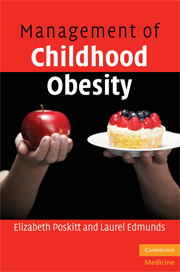Book contents
- Frontmatter
- Contents
- Foreword by David W. Haslam
- Preface
- Acknowledgements
- List of abbreviations
- 1 Introduction
- 2 How fat is fat? Measuring and defining overweight and obesity
- 3 Where should overweight/obese children be managed?
- 4 How do we approach the overweight/obese child and family?
- 5 The clinical assessment: what are the special points?
- 6 What complications should we look for now and later?
- 7 How does psychology influence management?
- 8 Management: what do we mean by lifestyle changes?
- 9 How can we reduce energy intake?
- 10 How can we increase energy expenditure?
- 11 What else can be done?
- 12 How can we sustain healthy weight management?
- 13 What can we do to prevent childhood overweight and obesity?
- References
- Index
4 - How do we approach the overweight/obese child and family?
Published online by Cambridge University Press: 08 August 2009
- Frontmatter
- Contents
- Foreword by David W. Haslam
- Preface
- Acknowledgements
- List of abbreviations
- 1 Introduction
- 2 How fat is fat? Measuring and defining overweight and obesity
- 3 Where should overweight/obese children be managed?
- 4 How do we approach the overweight/obese child and family?
- 5 The clinical assessment: what are the special points?
- 6 What complications should we look for now and later?
- 7 How does psychology influence management?
- 8 Management: what do we mean by lifestyle changes?
- 9 How can we reduce energy intake?
- 10 How can we increase energy expenditure?
- 11 What else can be done?
- 12 How can we sustain healthy weight management?
- 13 What can we do to prevent childhood overweight and obesity?
- References
- Index
Summary
Families seek advice on their children's weight problems for various reasons. Some children are concerned about their weight and are openly asking for help. Some children are brought by concerned parents but the children, because they are very young or for other reasons, are themselves unconcerned by their overweight. Some parents and children come to the clinic but deny weight is a problem, and the parents are not prepared to talk about the problem in front of their children or pretend they have no concerns about their children's weights. They attend because others – friends, relatives or the school – have told them they ‘must do something about the weight’. Initial approaches to overweight children and their families need to bear in mind these different presentations. Health care practitioners (HCPs) should avoid seeming to criticize parents or to refer automatically to the children as obese since some families are very sensitive to any mention of overweight and, even more, of obesity. Nevertheless, HCPs need to help families develop realistic understanding of the children's overweight and of the need for action.
Once the subject of the child's weight has been broached, first contact with overweight children and their families should focus on the families' expectations from the attendance (Wardle et al. 1995). For some, modifying over-ambitious ideas about what management of overweight can achieve is important.
- Type
- Chapter
- Information
- Management of Childhood Obesity , pp. 46 - 57Publisher: Cambridge University PressPrint publication year: 2008
- 1
- Cited by



